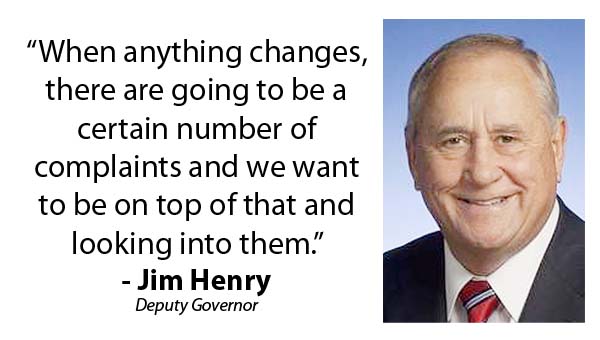Deputy Gov. defends 28-day TDOC schedule
Published 9:26 am Monday, August 17, 2015

Just under two weeks into his new job duties, Tennessee’s Deputy Gov. Jim Henry is hitting the ground running and traveling across the state to meeting with community leaders and state officials about important matters, including recent changes within the Tennessee Department of Corrections.
On Friday, the tour brought Henry and Assistant Commissioner of Corrections Tony Parker to Northeast Tennessee, where the pair toured TDOC’s Northeast Correctional Complex in Mountain City and met with employees there. They also met with local legislators to discuss concerns and complaints they had heard regarding recent changes within the TDOC.
“There have been some concerns about some of the changes,” said Henry, who also serves as the Chief of Staff for Gov. Bill Haslam. “We are trying to go and look at the complaints to see if we can work through them.”
Earlier this year, the TDOC moved from a traditional seven-day work schedule to a 28-day work schedule. State and federal laws allow certain types of agencies — such as law enforcement and correctional facilities — to operate on a 28-day work schedule as opposed to the traditional seven-day. This allows those agencies a longer span of time during the cycle to flex off extra hours worked to avoid overtime.
While there have been some positive responses to the change, there have been some complaints as well, Henry and Parker said.
“When anything changes, there are going to be a certain number of complaints and we want to be on top of that and looking into them,” Henry said. “The 28 days is not new. The Tennessee Highway Patrol uses it and a lot of other states use it as well.”
Parker feels the change over to the 28-day schedule will be beneficial to the Department of Corrections by helping the agency to save money by better managing overtime and also by improving employee retention.
Under the previous schedule, officers had to work their way up through the ranks to earn weekends off.
“When I started with the department, I was on night shift for three years and it was about four years before I started getting weekends off,” he said. “One of the advantages we see is it gives new employees a chance to have weekend days off. If we can give employees a weekend off to be with their families, we see that as a plus.”
The new schedule has corrections officers working six days on followed by three days off, then the pattern repeats. This spreads the days off out for every employee and gives everyone the chance to have scheduled weekends off, Parker said.
“I see it as the fairest way to distribute the days off,” Paker said. “But, I also see why some of the long time employees would be upset at losing their weekends.”
Switching over to the 28-day schedule will also allow TDOC facilities to reinstate roll call meetings for the oncoming shifts. At these meetings at the start of the shift, officers are briefed on any incidents that occurred that day at the facility as well as any changes. The meetings had been discontinued due to officers accruing overtime.
Reinstating the roll call meetings will help improve the safety of the officers as well as the security of the facilities, Parker said.
While most of the concerns heard by Henry and Parker on the eastern side of the state have dealt with the scheduling changes, it is a different story in the western part of the state, where many of the complaints surrounded vacant positions and understaffing in the correctional facilities.
But concerns and complaints aren’t all the pair are hearing as they travel the state.
“We’re hearing a lot of positives as well, especially about our public works programs” Henry said. In the public works programs, inmate work crews from the correctional facilities provide free labor to government agencies in a variety of tasks and skilled labor. The program not only helps local governments save money, it also teaches the inmates skills they can use once they get out of prison to gain employment and hopefully become productive citizens, Henry said.
Both Henry and Parker said they are enjoying traveling the state and meeting with TDOC employees and local leaders to work through the concerns and complaints surrounding the changes.
“It’s an important issue for the Governor and he wants us out looking into it,” Henry said.




